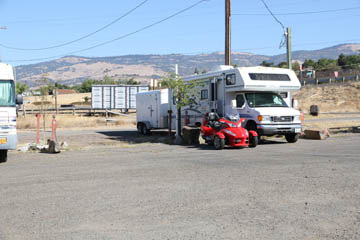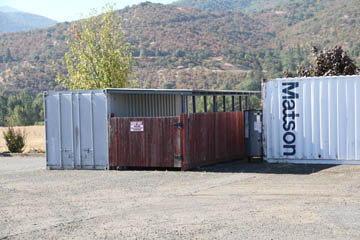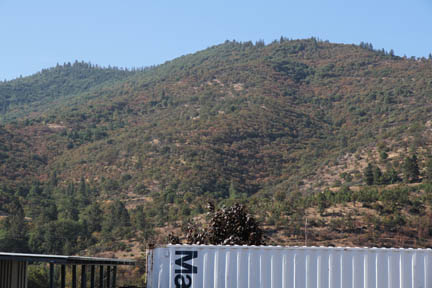John Muir's "Glad Tidings" at Ashland -- and Elsewhere
Fireside Chat: John Muir's "Glad Tidings" at Ashland -- and Elsewhere
J. William T. Youngs
9/24/2012
The “heroes” of History 498 are the landscapes encompassed by the national parks and the men and women who worked so hard to protect those landscapes. Again and again in our film and book on The National Parks we hear how important they are to our spirits. And all of this is true. One of John Muir’s most famous statements captures that sentiment well: "Climb the mountains and get their glad tidings. Nature’s peace will flow into you as sunshine flows into trees.”
When we read that passage, we assume that John Muir is writing about the National Parks. After all, the book in which that statement appears is called, Our National Parks.
But those “glad tidings” are available sometimes anywhere on the planet. That thought struck me this weekend at the humble “campground” where I am staying at this moment in Ashland, Oregon. It is an asphalt and gravel parking lot at an Econolodge motel with small spaces for RVs -- not much of nature right here. Look closely and you can see a tiny tree beside my rig. But there will be no campfires here, and no listening to a calming stream flowing by. In fact the only thing flowing by nearby is the traffic on Interstate 5!
J. William T. Youngs
9/24/2012
The “heroes” of History 498 are the landscapes encompassed by the national parks and the men and women who worked so hard to protect those landscapes. Again and again in our film and book on The National Parks we hear how important they are to our spirits. And all of this is true. One of John Muir’s most famous statements captures that sentiment well: "Climb the mountains and get their glad tidings. Nature’s peace will flow into you as sunshine flows into trees.”
When we read that passage, we assume that John Muir is writing about the National Parks. After all, the book in which that statement appears is called, Our National Parks.
But those “glad tidings” are available sometimes anywhere on the planet. That thought struck me this weekend at the humble “campground” where I am staying at this moment in Ashland, Oregon. It is an asphalt and gravel parking lot at an Econolodge motel with small spaces for RVs -- not much of nature right here. Look closely and you can see a tiny tree beside my rig. But there will be no campfires here, and no listening to a calming stream flowing by. In fact the only thing flowing by nearby is the traffic on Interstate 5!
Looking out from my office on wheels, the first thing that catches my eye is the trash area for the motel and a seemingly abandoned truck trailer.
Not much of nature here, apparently. But wait....When I step out in the morning I feel a welcoming breeze, I hear birds singing, and when I lift my eyes to the hills, I see above the clutter these rocks and trees and trails.
And what I sense in that moment is those "glad tidings"!
Now, I don't mean to suggest that we should abandon our study of the National Parks and turn our attention instead to this hillside in Ashland, Oregon! I'm only suggesting that in the Course of studying the big parks, we should also study our own reaction to the nature around us, that we should become students of our own feelings and relate them to the statements about nature that we study in History 498. When do each of us feel the "glad tidings" of nature?!
By the way, I haven't forgotten the National Parks. In about an hour I'll be driving my Spyder into its stable (aka trailer) and driving south into California and Lassen Volcanic National Park.
September 30, 2012
Afterward Before working on this "chat" I searched John Muir's "glad tidings" remark on Google, and I learned something interesting. Apparently what he actually wrote was "good" tidings and not "glad" tidings. But I got lots and lots of Google "hits" for "glad tidings." I think that sounds better, and even more like John Muir, and so I used it in this "chat." But to be thorough, here is the full quotation:
Walk away quietly in any direction and taste the freedom of the mountaineer. Camp out among the grasses and gentians of glacial meadows, in craggy garden nooks full of nature's darlings. Climb the mountains and get their good tidings, Nature's peace will flow into you as sunshine flows into trees. The winds will blow their own freshness into you and the storms their energy, while cares will drop off like autumn leaves. As age comes on, one source of enjoyment after another is closed, but nature's sources never fail.
Now, I don't mean to suggest that we should abandon our study of the National Parks and turn our attention instead to this hillside in Ashland, Oregon! I'm only suggesting that in the Course of studying the big parks, we should also study our own reaction to the nature around us, that we should become students of our own feelings and relate them to the statements about nature that we study in History 498. When do each of us feel the "glad tidings" of nature?!
By the way, I haven't forgotten the National Parks. In about an hour I'll be driving my Spyder into its stable (aka trailer) and driving south into California and Lassen Volcanic National Park.
September 30, 2012
Afterward Before working on this "chat" I searched John Muir's "glad tidings" remark on Google, and I learned something interesting. Apparently what he actually wrote was "good" tidings and not "glad" tidings. But I got lots and lots of Google "hits" for "glad tidings." I think that sounds better, and even more like John Muir, and so I used it in this "chat." But to be thorough, here is the full quotation:
Walk away quietly in any direction and taste the freedom of the mountaineer. Camp out among the grasses and gentians of glacial meadows, in craggy garden nooks full of nature's darlings. Climb the mountains and get their good tidings, Nature's peace will flow into you as sunshine flows into trees. The winds will blow their own freshness into you and the storms their energy, while cares will drop off like autumn leaves. As age comes on, one source of enjoyment after another is closed, but nature's sources never fail.



